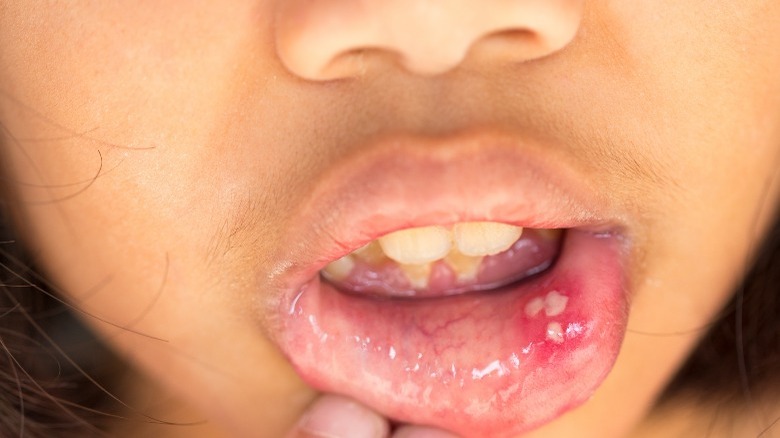If You Have Recurrent Mouth Sores, It Could Be Caused By This
Inflammation is the body's response to harm. It also plays a role in the healing process (per Healthline). The body releases inflammatory cells and cytokines to manage bacteria, injury, toxic chemicals, or viruses (via Cleveland Clinic). This is the start of the inflammatory response. In a perfect world, the inflammatory response can defend against infection and kick off the healing process.
There are two main kinds of inflammation. Acute inflammation occurs in response to immediate bodily damage, like tissue damage from hitting your arm on a table. According to WebMD, this type of inflammation usually subsides within a few hours or days. On the other hand, chronic inflammation is a long-term response that can occur in the absence of any harm. According to StatPearls, chronic inflammation can last for months to years, and can actually end up doing more harm than healing. In fact, chronic inflammatory diseases are "the most significant cause of death in the world." Chronic inflammation can lead to a number of symptoms ranging from pain to rashes (per Cleveland Clinic). Here's one chronic inflammatory condition that causes recurrent mouth sores.
Behçet's disease: Causes, symptoms, and treatment
If you have painful mouth sores that show up periodically over a long period of time, then you may have a rare condition known as Behçet's disease (per Cleveland Clinic). According to Mayo Clinic, even though the sores can heal in as little as one week — or as long as three weeks — they commonly return. The sores may appear similar to a canker sore, but appear in greater numbers over longer periods of time — and they hurt more. Other symptoms of Behçet's disease include joint pain, inflammation of the eyes, sores, and inflammation of the veins (per Cleveland Clinic). In extreme cases, the inflammation can affect the brain and spinal cord (via Merck Manual).
The exact cause of Behçet's disease is not known. Some researchers believe it is an auto-immune condition — where the body attacks healthy tissues (per National Health Service). The blood vessels are attacked in this specific condition. Some experts think that the disease is a result of both environmental and genetic factors (per MedlinePlus). For example, the HLA-B51 gene — a variant of a gene implicated in the immune system — increases a person's risk of developing Behçet's disease. With regard to the environment, some types of infection may factor into the disease's onset.
There is no cure for Behçet's disease (per Cleveland Clinic). Treatments include drugs like apremilast, corticosteroids, colchicine, and other immunosuppressants. While the condition is chronic, death is unlikely — only around 5% of cases are fatal.


